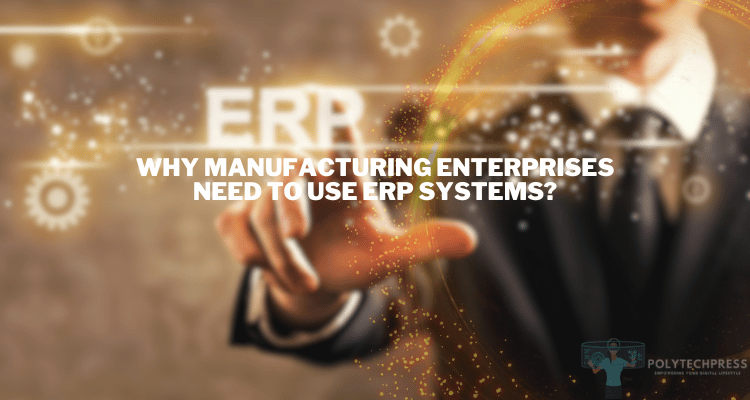Why Manufacturing Enterprises Need to Use ERP Systems?
In the ever-evolving and competitive world of manufacturing, businesses face challenges such as data silos, inefficient workflows, and lack of immediate operational insight. To cope with these challenges and succeed in the market, an increasing number of manufacturing companies are implementing enterprise resource planning (ERP) systems. These sophisticated software solutions are designed to consolidate and optimize various business processes, including production planning, inventory control, financial operations and human resource management. Today, together with PolyTechPress, you will delve deeper into why it is so important for manufacturing enterprises to use the capabilities of erp systems for manufacturing to stay ahead.
Basic Moments

The PolyTechPress team has highlighted basic points for you that will help you immediately navigate this issue. An ERP (Enterprise Resource Planning) system is a single software platform that centralizes and manages various business functions such as finance, human resources, supply chain, inventory, and manufacturing. The development of ERP systems was driven by the need for organizations to improve their operations, reduce costs and provide a competitive advantage in the market.
Key components of ERP systems
ERP systems are composed of essential components that integrate core business processes, enhancing efficiency and providing comprehensive insights across the organization.
| Modules | ERP systems are comprised of several key modules, including Finance, Human Resources (HR), Inventory Management, and Supply Chain Management. |
| Integration Capabilities | They can seamlessly integrate with other tools and systems, which is crucial for maintaining the flow of data across departments. |
| Reporting and Analytics | Enhanced reporting features allow for a deeper analysis of business operations, facilitating improved decision-making. |
Challenges Faced by Manufacturing Enterprises
Today, we’re highlighting some of the key challenges that manufacturing enterprises often encounter in their operations.
Many manufacturing firms struggle with data silos and disjointed processes, which can hinder efficiency and accuracy across departments.
Without access to real-time data, it’s difficult for manufacturers to make informed decisions quickly, impacting their ability to respond to market changes and operational needs.
Inefficient use of resources can lead to increased operational costs and reduced production output, affecting overall profitability.
Staying compliant with industry regulations and standards is a constant challenge, as failure to do so can result in hefty fines and damage to reputation.
How ERP Systems Address Manufacturing Challenges
Let’s explore how ERP systems can effectively address the common challenges faced by manufacturing enterprises. For a more convenient perception of the information, we have collected it in a condensed table for our readers.
| Challenge Addressed | How ERP Systems Help |
|---|---|
| Centralized Data Management | ERPs consolidate data across departments, eliminating silos and improving accuracy. |
| Streamlined Processes | Automation and integration of processes reduce manual effort and increase efficiency. |
| Enhanced Visibility and Control | Real-time data and analytics provide better oversight and control over operations. |
| Improved Decision-Making | Integrated data systems facilitate informed and timely decisions. |
| Scalability and Flexibility | ERP systems adapt to growth and changes in business requirements. |
Key Benefits

Undoubtedly, the implementation of ERP systems in production has a number of undeniable advantages, which have already been appreciated by many businesses from different countries. Based on their many years of experience, several points can be highlighted. In turn, the PolyTechPress team emphasizes that these advantages together create a solid foundation for manufacturers to thrive in today’s dynamic market environment.
#1 Cost Reduction
ERP systems optimize operations and reduce waste, leading to significant cost savings across the manufacturing process.
#2 Increased Productivity
Automation of routine tasks frees up employee time for more value-added activities, thus enhancing overall productivity.
#3 Better Inventory Management
With advanced tracking and forecasting capabilities, ERP systems ensure optimal stock levels and reduce holding costs.
#4 Enhanced Quality Control
Integrated quality management modules help maintain high standards throughout the production cycle, minimizing defects and maximizing output quality.
#5 Improved Customer Satisfaction
By streamlining operations from order to delivery, ERP systems help in providing faster service and higher product quality, leading to enhanced customer satisfaction.
Factors to Consider Before Implementing ERP Systems
While ERP systems offer significant benefits, manufacturing businesses must consider several key factors before implementation.
Estimate the total investment required for an ERP system, including initial costs, training, and ongoing maintenance. Evaluate customization needs to suit specific business processes and ensure compatibility with existing systems.
Prepare for organizational change and develop comprehensive training programs to ensure smooth implementation. Select an ERP vendor with extensive manufacturing experience. Consider their support services and plans for future updates to ensure long-term success.
The Bottom Line
Many experts and production owners agree that the implementation of ERP technologies is no longer an option, but a necessity. By carefully assessing their specific requirements, everyone can choose the right ERP solution and implement effective change management strategies. This way, manufacturing businesses can unlock the full potential of ERP systems and set themselves on the path to long-term success.






